Foreign exchange Market
Naira remained stable against the US dollar on Wednesday to close at N411.45/$1. This was the same rate that was recorded on Tuesday, 6th July 2021.Also, the naira maintained stability at the parallel market, as it closed at N503 to a dollar. This was the same rate that was recorded in the previous trading session. Nigeria’s external reserve continues to plunge, as it heads to its lowest position in four years with a year-to-date decline of over $2 billion.
At the I&E FX market, Naira remained unchanged at ₦411.45. Most participants maintained bids between ₦387.67 and ₦420.86 per dollar.
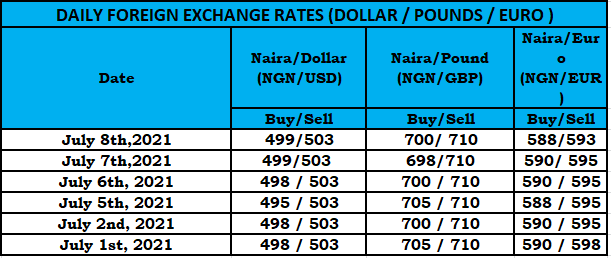
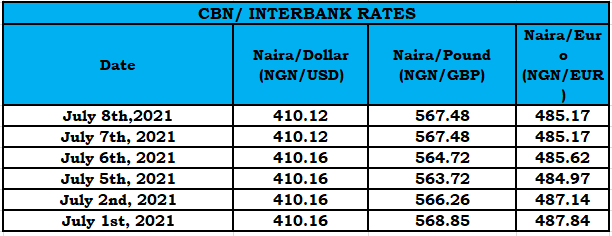
TREASURY BILLS PRIMARY MARKET AUCTION (PMA).


In the secondary market for treasury bills instruments , market sentiment was bearish with average yield across the curve increasing by 1 basis point to close at 6.75% from 6.74 % previous day.However, the average yields across short term and mid term maturities closed flat at 4.34 % and 5.46 % respectively. Selling pressure was witnessed in the NTB 12-May-22 maturity bill with a yield increase of 23 bps, while yields on 20 bills remained unchanged.
In the OMO bills market, the market experienced same bearish sentiment although it was notably on the long term maturities. Yields on 22-Feb-22 maturity bill recorded the highest increase of 22 bps.The average yield across the curve increased by 2 bps to close at 9.93 % as against the last close of 9.91 %. Mid maturities closed flat at 9.28 % and 9.91 % respectively.
BENCHMARK SECONDARY MARKET TREASURY BILLS
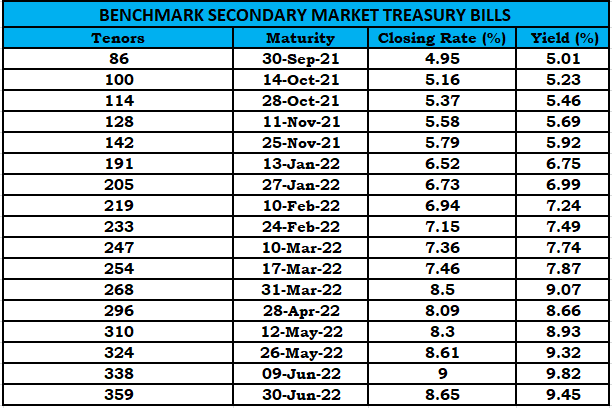
MONEY MARKET
The Overnight rate increased by 0.25 percent to close at 10.50 percent as against the last close of 10.25 percent, and the Open Buy Back rate also increased by 0.25 percent to close at 10.00 percent compared to 9.75 percent on the previous day.

PREVIOUS FGN BOND PMA AUCTION RESULT

The DMO has released its FGN Bonds Issuance Calendar for the third quarter of 2021, indicating plans to raise funds in the range of ₦450 billion – ₦540 billion to finance the budget deficit over the next three months. Furthermore, the DMO is expected to offer bonds during the quarter through re-opening of 10-year (₦150 billion – ₦180 billion), 20-year (₦150 billion – ₦180 billion), and 30-year (₦150 billion – ₦180 billion) tenors
FGN bonds secondary market closed on a flat note today, as the average bond yield across the curve remained unchanged at 9.53 percent. Average yield across the short tenor of the curve declined by 1 basis point, while the average yield across the medium tenor of the curve expanded by 2 bps. However, the average yield across the long tenor of the curve remained unchanged. The FGNSB 19-JUN-2022 bond was the best performer with a decline in yield of 6 bps, while the 22-JAN-2026 maturity bond was the worst performer with an increase in yield of 7 bps.
FGN BOND MARKET YIELD CURVE

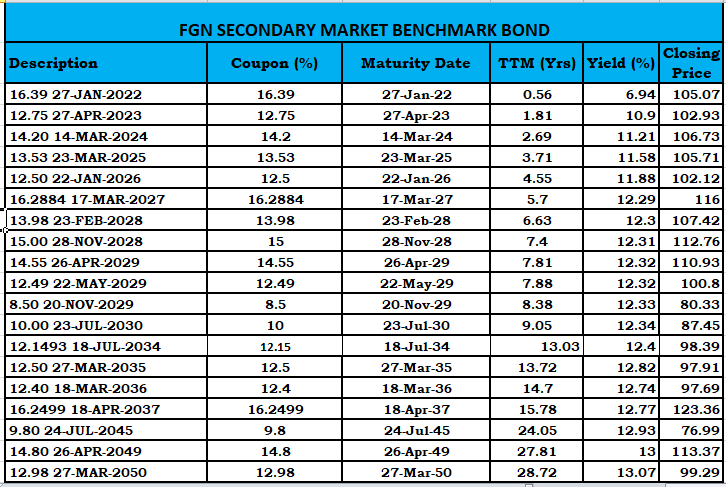
Naira weakens at official market as forex liquidity improves by 55%
The exchange rate between the naira the US dollar closed at N411.45/$1 at the Investors and Exporters window, where forex is traded officially.Naira depreciated against the US dollar on Tuesday, having lost 32 kobo to close at N411.45/$1 compared to N411.13/$1 recorded on Monday, 5th July, 2021.The local currency weakened against the dollar at the official market while forex liquidity improved by 54.7%Meanwhile, the naira was stable at the parallel market, as it closed at N503 to a dollar. This was the same rate that was recorded in the previous trading session. Also, Nigeria’s external reserve continues to plunge, as it heads to its lowest position in four years and a year-to-date decline of over $2 billion.
GHANA PROPOSES AFRICA’S FIRST $2 BILLION SOCIAL BONDS
Ghana plans to issue up to $2 billion in green and social bonds by November, making it the first African country to sell debt to support development projects.
Ghana would become a leader in African social bond issuance, capitalizing on an instrument that has grown in popularity since the coronavirus pandemic.
A green bond is a fixed-income instrument designed particularly to raise funds for climate and environmental projects. Because these bonds are usually asset-linked and backed by the issuing entity’s balance sheet, they normally have the same credit rating as the rest of the issuer’s debt obligations.Only a few sovereigns, like Chile and Ecuador, have sold them so far. Despite having posted its lowest economic growth rate in 37 years in 2020, Ghana will use the earnings to continue with a free secondary-school programme that began in 2017. Sustainable bonds “are not cheap, there is no discount,” Ghanaian Finance Minister, Ken Ofori-Atta said. “We will seek to negotiate for the best terms though.”Africa’s biggest gold miner anticipates output to grow 5% this year, up from 0.4% last year, while it aims for a budget deficit of 9.5% of GDP this year, down from 11.7% in 2020.
DIASPORA NIGERIANS SWITCH AWAY FROM REAL ESTATE AS DEPRECIATING EXCHANGE RATE ERODES RETURNS
Fr years ago, when Nigeria first suffered a major currency crisis, Chukwuemeka decided it was time to invest in Nigeria. Following the devaluation that occurred in 2016, his $50,000 savings when converted to naira is worth N19 million much higher than the N9.8 million it was worth just two years earlier. He plunged his savings into real estate investments in the country acquiring a slew of rental properties that helped generate income from his motherland. By the time he was done in 2017, he had sunk in over $100,000 or about N36 million in Nigeria as investments.
CHINA’S ECONOMY SEES NEW POCKETS OF GROWTH IN RISING SHOPPING TREND.
KEY POINTS
- Chinese brands were able to adapt more quickly to local trends than foreign brands last year, according to the latest “China Shopper Report” from Bain & Company and Kantar Worldpanel.
- People living in smaller cities were also more willing to spend last year than those living in large ones, the report said.
- However, Chinese consumers overall are more price sensitive than before, the analysis found.
BEIJING — Chinese consumers spent less on daily necessities from foreign brands last year during the coronavirus pandemic, while those in smaller cities were more willing to spend than those in large ones, according to a report.
The report, co-authored by consultancy Bain & Company and analytics company Kantar Worldpanel, reflects pockets of growth in an economy that was already slowing its expansion before the pandemic. The “China Shopper Report” — which the firms have conducted for 10 straight years — looks at a category called “fast-moving consumer goods” that includes food, beverages, personal care and home care. Items such as apparel are not included.
EURO STRUGGLES AS INVESTOR SENTIMENT DISAPPOINTS
The euro dived towards a three-month low against a broadly steady dollar on Tuesday as disappointing data tarnished some of the single currency’s allure while Antipodean currencies held on to their gains, buoyed by robust data and hawkish comments.
Investor sentiment in Germany, the euro zone’s biggest economy, remains at a high level but fell sharply in July, the ZEW economic research institute reported, while data showed orders for German-made goods posted their sharpest slump in May since the first lockdown in 2020.
The data dented the euro which weakened about 0.2% to $1.1844 towards midday trading in Europe. It fell to an early April low of $1.1807 last week.
Both (indicators) work in that direction, but the timing of the move suggests it is more flow-related in quiet summer markets,” said Adam Cole, chief currency strategist at RBC. The common currency has been also struggling to keep up with the greenback in the past month with the European Central Bank seemingly far behind many of its peers in the tightening cycle.
As inflation pressure in the euro zone remains comparatively moderate the ECB is likely to take its time with the reduction in asset purchases,” Commerzbank strategist You-Na Park-Heger wrote in a morning note to her clients. ECB policymakers are in the middle of debating a new strategy, with many now backing the notion of letting inflation surpass 2% for a while after it lagged below that level for most of the past decade.
SOURCE:

DISCLAIMER: This publication is strictly for information purposes only for Zock capital and invest LLC and its employees take no responsibility or liability as to the accuracy and completeness of the information.
For further ./enquiries/information on this publication, please contact Research and Economic Intelligence .
By: Judith Idialu: Zock capital and Investment LLC,
0805 598 0595


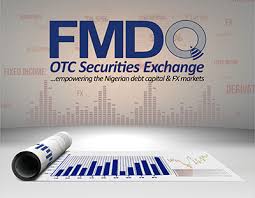

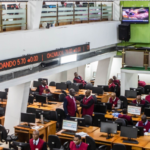
Comment here